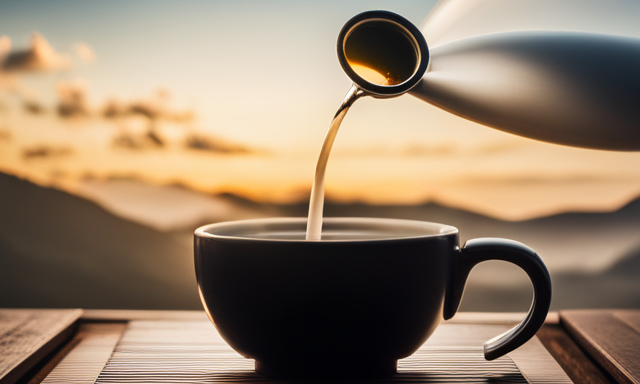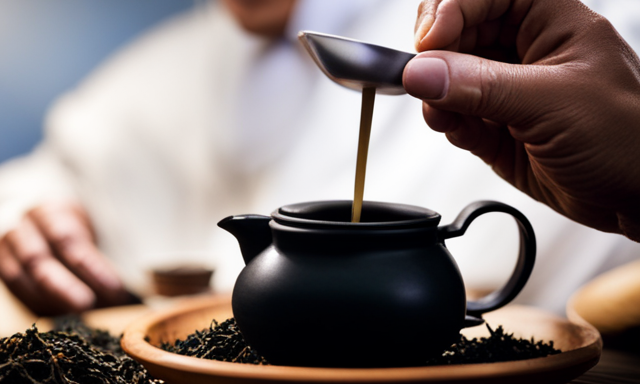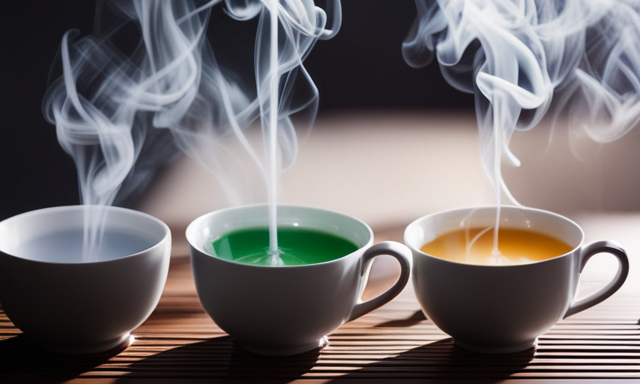Have you ever wanted to find a beverage that is not only delicious but also offers numerous health benefits? Look no further than oolong tea.
This golden elixir is like a soothing symphony for your taste buds, with its unique flavor profile that dances between the freshness of green tea and the richness of black tea. As a tea enthusiast, I can confidently say that oolong tea is a hidden gem that deserves more recognition.
Originating from China, oolong tea comes in various varieties, each with its own distinct character and aroma. The brewing process is an art in itself, as the leaves unfurl and release their exquisite flavors.
But what truly sets oolong tea apart are its health benefits. It has been proven to aid in weight loss by boosting metabolism and promoting heart health. Additionally, it can contribute to mental well-being, providing a much-needed moment of tranquility in our busy lives.
So, if you’re searching for a beverage that not only delights your senses but also improves your overall well-being, give oolong tea a try. It might just become your new favorite daily ritual.
Key Takeaways
- Oolong tea enhances brain function by combining caffeine and theanine, improving attention and boosting mental alertness.
- Regular consumption of oolong tea improves memory, focus, and cognitive abilities.
- Oolong tea promotes mental well-being by providing a moment of calm in a busy day.
- Oolong tea offers numerous health benefits, including protection against harmful free radicals, boosting metabolism and aiding in weight management, and promoting heart health.
Introduction to Oolong Tea
If you’re looking for a tea that combines the rich flavors of black tea and the delicate notes of green tea, then oolong tea is the perfect choice for you! Oolong tea is a traditional Chinese tea that falls between the categories of black and green tea. It undergoes a partial oxidation process, which gives it a unique flavor profile.
The flavor characteristics of oolong tea can vary depending on the oxidation level, but generally, it offers a smooth and well-balanced taste with a hint of floral or fruity notes. The production of oolong tea involves withering the leaves, rolling them, and then allowing them to partially oxidize before they are fired. This intricate process contributes to oolong tea’s complex and nuanced flavor.
Understanding the flavor profile of oolong tea will help you appreciate its diverse range of tastes and aromas.
Understanding the Flavor Profile of Oolong Tea
To fully appreciate the delicate nuances of oolong tea, you must explore the intricate range of flavors it offers. Oolong tea is known for its unique flavor profiles, which can range from floral and fruity to nutty and roasted.
The flavor of oolong tea is influenced by various factors, including the oxidation level, the type of tea leaves used, and the brewing techniques employed. For example, lightly oxidized oolong teas tend to have a more floral and delicate flavor, while heavily oxidized ones have a richer and more robust taste. Additionally, the brewing techniques, such as water temperature and steeping time, can further enhance or alter the flavor of oolong tea.
Understanding the flavor profile of oolong tea allows tea enthusiasts to fully appreciate its complexities and enjoy a truly satisfying tea experience.
Now, let’s delve into the origins and varieties of oolong tea.
The Origins and Varieties of Oolong Tea
Originating from the misty mountains of Fujian province, oolong tea is a mesmerizing brew that transports you to the serene tea gardens of ancient China. With its rich cultural significance, oolong tea holds a special place in Chinese history and traditions.
This tea is known for its unique processing methods, which contribute to its distinct flavors and aromas. There are various processing techniques used for oolong tea, including withering, oxidation, and firing. Each method is carefully executed to bring out the desired flavors and characteristics of the tea leaves. The level of oxidation can vary, resulting in a wide range of oolong tea varieties, from light and floral to dark and robust. These processing methods truly highlight the craftsmanship and expertise involved in creating this exceptional tea.
Transitioning into the subsequent section about the brewing process for oolong tea, let’s explore how to prepare this delightful beverage.
The Brewing Process for Oolong Tea
Get ready to experience the full flavors and exquisite aromas of oolong tea as you embark on the brewing process. Brewing oolong tea requires specific techniques to bring out its unique characteristics.
The first step is to heat the water to around 185°F, as using water that’s too hot can result in a bitter taste.
Next, add the oolong tea leaves to a teapot, using approximately 1 teaspoon of leaves for every cup of water. Allow the leaves to steep for about 3-5 minutes to release their flavors.
The resulting brew will have a delicate balance of floral, fruity, and toasty notes, depending on the specific variety of oolong tea used.
As we move into the next section about the health benefits of oolong tea, you’ll discover the additional reasons to enjoy this remarkable beverage.
Health Benefits of Oolong Tea
The health benefits of oolong tea are as refreshing and invigorating as a cool breeze on a hot summer day. This delightful tea not only satisfies your taste buds, but also offers a range of benefits for your overall well-being. Oolong tea is known for its weight management properties, making it a popular choice among those looking to shed some pounds. It helps boost metabolism, aiding in the breakdown of fats and promoting weight loss. Additionally, oolong tea is a great ally for healthy skin. Its rich antioxidants and polyphenols help protect the skin from damage caused by free radicals, keeping it youthful and radiant. So, if you’re looking to manage your weight and improve your skin health, a cup of oolong tea is just what you need. In the next section, we’ll explore the weight loss and metabolism boosting properties of oolong tea.
Weight Loss and Metabolism Boosting Properties of Oolong Tea
If you’re looking to shed some pounds and rev up your metabolism, there’s one delicious beverage that can help you achieve your goals – oolong tea. Oolong tea has been praised for its weight loss and metabolism-boosting properties, making it a popular choice among health enthusiasts. Here are some reasons why oolong tea is beneficial for weight loss and metabolism:
- Oolong tea contains polyphenols that can increase fat oxidation, helping your body burn more calories.
- It has been found to enhance metabolism and increase energy expenditure, making it easier to maintain a healthy weight.
- Oolong tea can aid digestion by promoting the production of enzymes that break down fat and carbohydrates.
- It also helps regulate blood sugar levels, which can prevent cravings and overeating.
- Additionally, oolong tea is rich in antioxidants that promote skin health, giving you a radiant and glowing complexion.
Transitioning into the subsequent section about oolong tea and heart health, this amazing beverage also has numerous benefits for your cardiovascular system.
Oolong Tea and Heart Health
Transitioning to the benefits of oolong tea for your cardiovascular system, this amazing brew can enhance your heart health in numerous ways.
Oolong tea has been found to have a positive impact on diabetes management, as it helps regulate blood sugar levels and improves insulin sensitivity. Additionally, oolong tea contains antioxidants called polyphenols, which have been shown to reduce the risk of developing certain types of cancer. These polyphenols help prevent the growth of cancer cells and protect against DNA damage.
By incorporating oolong tea into your daily routine, you can potentially lower your risk of heart disease, diabetes, and certain types of cancer.
In the next section, we will explore the role of oolong tea in mental well-being, highlighting its calming properties and ability to reduce stress.
The Role of Oolong Tea in Mental Well-being
With its calming properties and stress-reducing abilities, oolong tea has the power to bring tranquility to your mind and improve your mental well-being. Oolong tea has been found to have a positive impact on stress and anxiety levels. The polyphenols present in oolong tea can help reduce the release of stress hormones, allowing you to feel more relaxed and at ease.
Additionally, oolong tea has been shown to improve cognitive function. The combination of caffeine and theanine in oolong tea can enhance brain function, improve attention, and boost mental alertness. Regular consumption of oolong tea can also help improve memory and focus.
Incorporating oolong tea into your daily routine can be a simple yet effective way to promote mental well-being and enhance cognitive abilities.
Incorporating Oolong Tea into Your Daily Routine
Adding oolong tea to my daily routine has become a soothing and beneficial ritual that’s truly improved my mental well-being and enhanced my cognitive abilities.
Not only does it provide a moment of calm in the midst of a busy day, but it also offers numerous health benefits. Incorporating oolong tea into my daily routine has allowed me to reap the benefits of its antioxidants, which help protect my body against harmful free radicals.
Additionally, oolong tea has been shown to boost metabolism, aid in weight management, and promote heart health. Its unique combination of caffeine and L-theanine also provides a gentle energy boost without the jitters or crashes associated with other caffeinated beverages.
Overall, incorporating oolong tea into my daily routine has been a game-changer for my overall well-being.
Frequently Asked Questions
Can oolong tea be consumed by pregnant women or nursing mothers?
Oolong tea is generally safe for pregnant women, but it’s best to consult with a healthcare provider. For breastfeeding mothers, moderate consumption is fine, as long as it doesn’t interfere with the baby’s sleep or cause any adverse reactions.
Is oolong tea suitable for individuals with caffeine sensitivity?
Yes, oolong tea may not be suitable for individuals with caffeine sensitivity due to its caffeine content. However, it does offer numerous health benefits, such as aiding in weight management and improving heart health.
How does the oxidation level of oolong tea affect its flavor?
The oxidation level of oolong tea is like a symphony conductor, bringing out the harmonious notes of its flavor profile. As the leaves oxidize, the taste becomes more complex, with hints of fruity, floral, and roasted flavors.
Are there any potential side effects of consuming oolong tea?
Potential health benefits of oolong tea include improved digestion, weight management, and reduced risk of heart disease. However, excessive consumption may lead to caffeine-related side effects. It is recommended to limit intake to 2-3 cups per day.
Can oolong tea be enjoyed both hot and cold?
Yes, oolong tea can be enjoyed both hot and cold. Whether you prefer a soothing cup of hot oolong or a refreshing glass of iced oolong, you can still reap the health benefits it offers.
Conclusion
In conclusion, I highly recommend incorporating Oolong tea into your daily routine. Its unique flavor profile and numerous health benefits make it a valuable addition to any lifestyle.
While some may argue that Oolong tea is too expensive or difficult to find, it’s worth the investment for the positive impact it can have on your well-being.
So, don’t hesitate to give Oolong tea a try and experience its remarkable effects on your metabolism, heart health, and mental well-being.
Cheers to a healthier and happier you!









